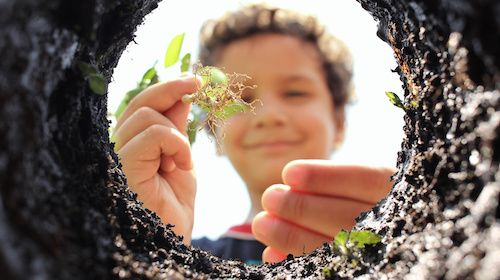Following the Queen’s Speech on Tuesday, fears have been raised about a new Planning Bill that could undermine environmental protections. The bill will create a simpler and faster planning system and reforms will be made to the environmental impact assessment (EIA) regime. The SSA’s Sustainable Urban Soil Health Initiative (SUSHI) working group responded to the Planning for the Future consultation last year, highlighting the need for planning policy to address soil recovery and sustainable use.
On Wednesday, the European Commission announced its plan to reduce pollution to levels that are no longer harmful to human health and natural ecosystems by 2050. In order to boost soil quality, the European Commission has committed to reducing nutrient losses and the use and risk of chemical pesticides by 50%, a target included in its Farm to Fork strategy.
The British Ecological Society published its report on ‘Nature-based Solutions for Climate Change in the UK’, presenting how nature-based solutions can tackle both the climate and biodiversity crisis. Soils are featured throughout the report as part of many habitats including woodlands, peatlands and arable landscapes due to their ability to absorb and filter water, support biodiversity, cycle nutrients and store carbon.
Recent research based on farmers interviews has found that recent extreme weather conditions are having adverse impacts on British agriculture, including soil run-off and erosion. The study shows that whilst for many farmers these changes to the weather are too uncertain and long-term for them to invest significant time or money in planning for them, others are building resilience within their business through actions such as to improve soil health.
The Australian government has announced a A$200 million National Soils Strategy. The 20-year plan aims to 1) prioritise soil health in policy development and management strategies, 2) incentivise soil stewardship and innovation, and 3) increase soil knowledge through standardised data collection, strengthen training and accreditation programs, and integrate soils into the national school curriculum.
Following last week's headlines on pesticides harming vital soil organisms, a new study published this week reveals the impact of 70 years of pesticide use on European soils. The research team emphasises the need to define and introduce regulations on pesticide cocktails to protect soil's biodiversity as well as taking into account the persistence of residues in organic soils.
New research demonstrates the effects of microplastic on soils that aren’t directly contaminated. The study explored the indirect effects of microplastic on adjacent soil layers, providing evidence that microplastic can still act as an anthropogenic barrier, interrupting soil water flows and changes in physical structure.
A two-part series published in ARC2020 explores the impact that the globalised textile industry has on soil, highlighting that soil-depleting growing methods and pollution from chemical dyes often goes unnoticed. The series also looks at the burgeoning soil-to-soil textile movement, aiming to restore soil health and strengthen local economies by regenerating local textile ecosystems.
Photo by bladiavila.
